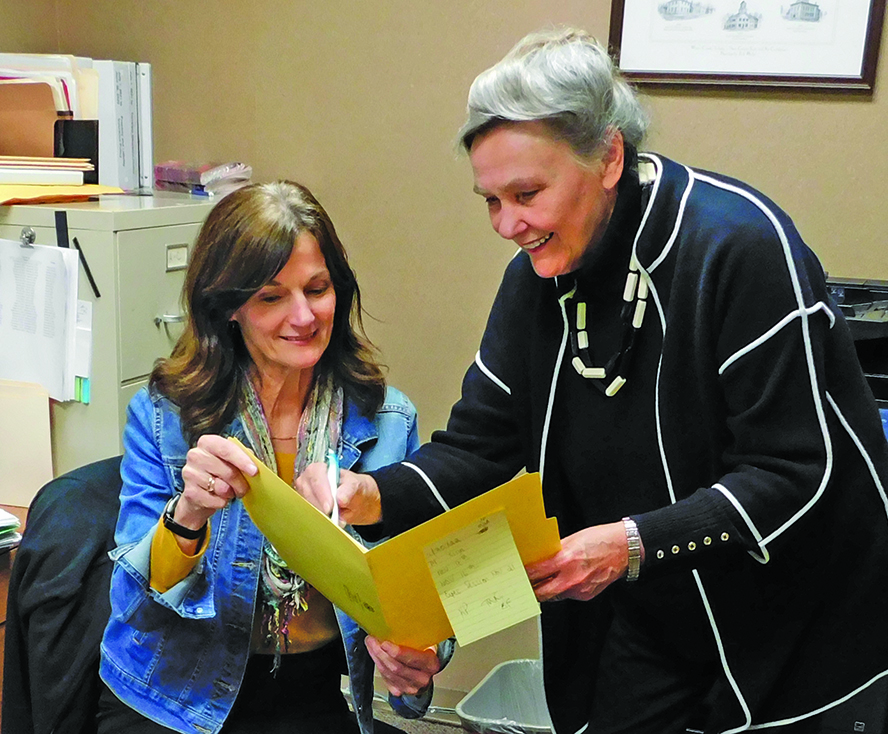Coordinating the use of millions of dollars in community improvement funding is no small job, and it’s one that could help shape life in Wayne County for years to come.
Beth Fields is ready for the challenge.
The state designed the Hoosier Enduring Legacy Program to help Indiana communities best utilize Coronavirus Local Fiscal Recovery Funds from the American Rescue Plan Act dollars. Wise spending will make a long-lasting impact, something Fields will facilitate.
Fields has been chosen as Wayne County’s HELP coordinator. The county made a two-year commitment to funding the position as it and seven of its communities plan and implement ARPA-funded programs.
“To think I could be a part of something called a legacy program is pretty exciting,” Fields said.
The Indiana Office of Community and Rural Affairs accepted Wayne County’s collaborative HELP application during November 2021 and assigned it to the third cohort that begins in January 2023.
A group of community leaders attended a Dec. 1 ceremony for Wayne County and the two other cohort participants, Connersville and Franklin County, in the Statehouse at Indianapolis. They received a certificate indicating the state will provide an additional $1 million during the HELP process.
Ken Paust, president of Wayne County’s commissioners, presented that certificate during the Dec. 7 Wayne County Council meeting. That’s also when he announced Fields would be leaving the commissioners office for her new role.
“Beth is just a wealth of knowledge and experience and will take on this position with tremendous enthusiasm,” Paust said. “She will work very well with all of the towns and communities and will be just a tremendous asset to Wayne County in the coordinator’s position.”
Cambridge City, Dublin, East Germantown, Economy, Milton, Richmond and Spring Grove joined Wayne County’s HELP application. Each pledged 30% of its ARPA allotment to projects identified during the HELP process, while Wayne County pledged $10 million of its nearly $12.8 million allotment.
For now, the county has invested its ARPA allocation, and Paust told council members that projections indicate the money will grow by another $1 million before the end of 2024.
“It will be exciting to see in the end what that turns into dollar wise,” said Beth Leisure, the council president. “It’s exciting.”
Richmond received about $7.5 million in ARPA funding, with the other participating communities receiving smaller amounts.
Wayne County’s HELP schedule reserves 2023 for planning, which will include public input opportunities. Project implementation is scheduled to begin during 2024.
“It’s a tremendous opportunity to do some projects we otherwise couldn’t do because the funding wouldn’t be there,” Paust said.
Fields’ role will be that of planner and coordinator, something she said plays into her skill set. She will not make decisions about what projects are selected to utilize ARPA funding. Each community makes those decisions for its money.
As momentum grew for Wayne County’s HELP application, Fields said the program sounded interesting. She heard Commissioner Jeff Plasterer speaking about the program.
“Personally, I was ready for a change,” said Fields, who has spent 21 years with county government. “I needed to be challenged.”
Commissioners are technically part time, so Fields is the only full-time employee in the commissioners office. Fields serves as a coordinator within the commissioners office, attends meetings and interacts with county departments and the public.
“She makes me get everything done that I’m supposed to get done,” Paust said. “I can ask her anything, and she’ll pull it out of a file. She’s a real help and allows me to concentrate on other projects we have going on.”
Now, Fields will have the opportunity to connect more with leaders and residents of the participating Wayne County towns.
“I’m so looking forward to meeting community members from the smaller towns,” she said.
Ironically, Fields will also work closely with another Beth Fields, the city of Richmond’s director of strategic initiatives. That Beth Fields was among those playing an integral role in the county coalition’ application and ultimate selection.
Those leaders will continue working with the coordinator and will play important decision-making roles as the county tries to implement projects that will leave — as the HELP name says — a legacy.
“There are already people who brought HELP to this point, and they are still going to be closely involved,” Fields said. “My role is to coordinate, not be a decision maker.”
That fits perfectly for someone who has coordinated for the commissioners and enjoys solving problems.
“I’m grateful,” Fields said about her new role. “It’s exciting, and I’m looking forward to it.”

